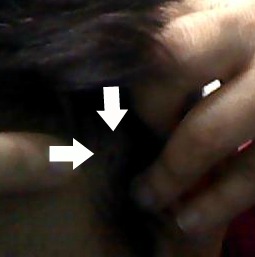While at the hairdresser just the other day, Shana (my stylist/colorist) found a raised mole that was not there when she did my hair four weeks ago. Just this morning I called my doctor for a referral to get it looked at. When I hung up the phone I found THIS ARTICLE in my in-box.
FATE? Or is this just the universe looking out for me?
Melanoma affects the young, the old, the fair skinned and the dark skinned. Contrary to the common belief that only fair-skinned individuals can be affected, dark skin does not indicate immunity to skin cancer. Although Caucasians are the primary targets for skin cancer, people with darker skin tones are also at risk. In fact, melanoma is usually more deadly for people with darker skin because they usually take fewer precautions and are commonly misdiagnosed or diagnosed too late.
This misconception may derive from the fact that people who have a darker complexion have more melanin in their skin. Melanin, which gives color to your skin, also acts as a natural shield against damaging sunrays, thus making darker-skinned people less prone to UV radiation damage and sun burns. However, that does not mean you are invincible to skin cancer if you have colored skin, because this natural protection is not flawless.
Several factors can lead to a high risk of developing skin cancer, regardless of your skin color:
- Overexposure in the sun
- A history of sunburns
- The presence of moles and/or skin lesions
- Family history of skin cancer
- Living in high-altitude climates or near the equator
- A weakened immune system
- Overexposure to radiation, or other substances such as arsenic
Because melanoma, one of the fastest-growing cancers and the most deadly form of skin cancer in the U.S. does not discriminate, people of all skin colors need to be aware of its risk factors and preventative measures to help lower your risk. Self-exams can help you identify potential skin cancers early, when they can almost always be completely cured. Regular visits to your dermatologist, self-checks, and enrolling in an early detection surveillance program to monitor existing and new moles and lesions are essential in keeping you and your skin healthy all year long.
This guest post is from Dr. Richard Bezozo, President of Molesafe, the world’s most advanced melanoma screening program. MoleSafe combines advanced technology with the skills of one of a panel of highly qualified melanoma dermatologists / dermoscopists to diagnose melanoma at the earliest possible stage. I have included a blog post below about the dangers of melanoma, and how anyone can be affected by it. I bring this to your attention since skin cancer is the most common form of cancer in the Unites States resulting in more than 3.5 million new cases a year but it’s also the most preventable.

